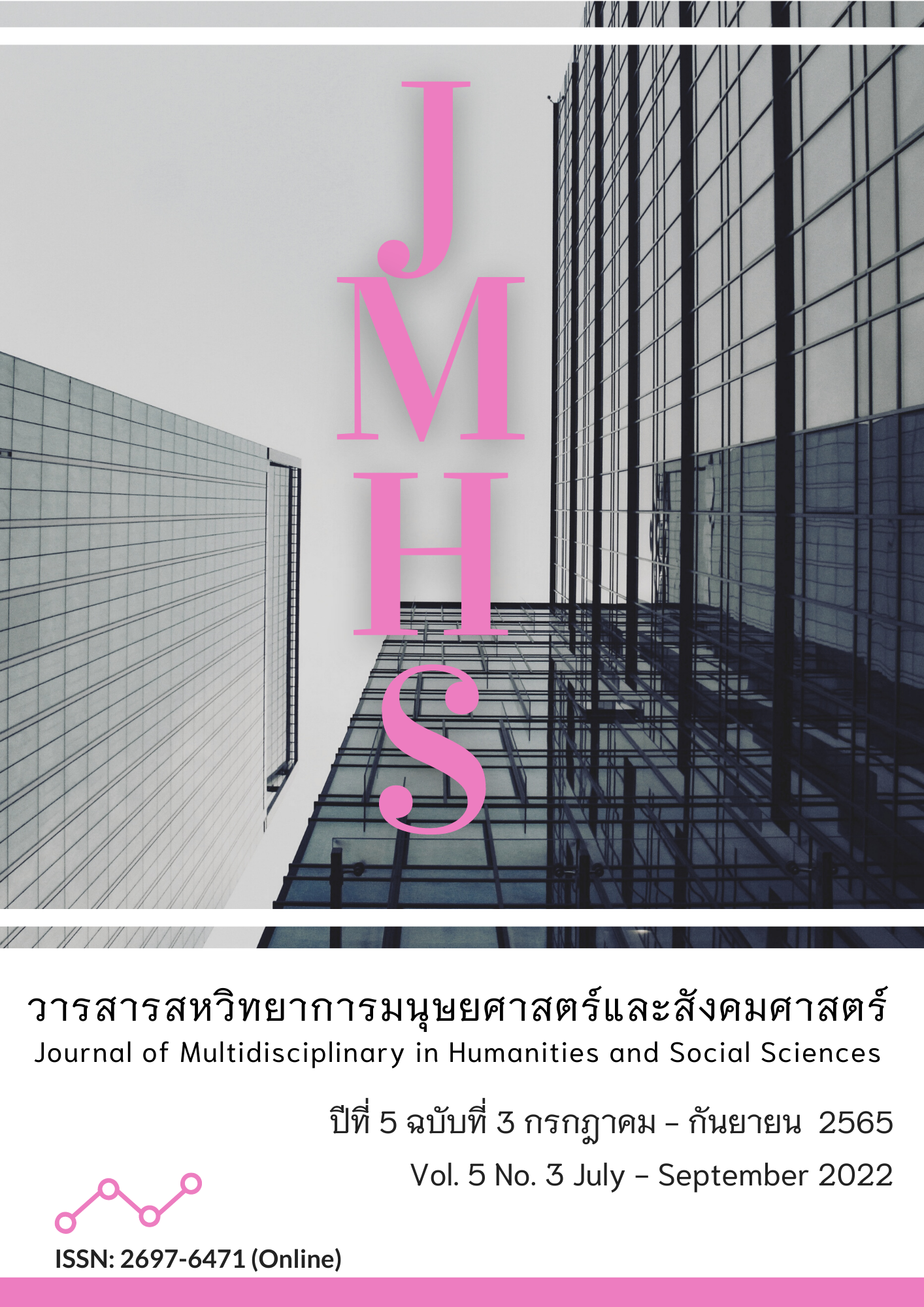Effect of Online Training Process Efficiency on Staff Performance Under New Normal Conditions: A Case Study of Rajamangala University of Technology Thanyaburi
Main Article Content
Abstract
The purposes of this study were: 1) to evaluate the efficiency of the online training process under new normal conditions at Rajamangala University of Technology Thanyaburi (RMUTT); 2) to assess the level of work performance efficiency of RMUTT employees; and 3) to investigate the effect of online training process efficiency on work performance efficiency of RMUTT employees. The sample group used in this study comprised 338 RMUTT employees. They were selected by using the stratified sampling method. The research instrument used to collect data was a questionnaire. The statistics used to analyze the data were frequency, percentage, mean, standard deviation, independent sample t-test, one-way ANOVA, and multiple regression analysis.
It was found that: 1) the efficiency of the online training process under the New Normal conditions at RMUTT was rated at a high level; 2) the level of work performance efficiency of RMUTT employees under New Normal conditions was at a high level; and 3) the number of training sessions per year and the dimensions of the online training process, comprising development of the online training process, conducting training, and training evaluation, all affected the work performance efficiency of RMUTT employees at a statistically significant level of .05.
Article Details

This work is licensed under a Creative Commons Attribution-NonCommercial-NoDerivatives 4.0 International License.
Views and opinions appearing in the Journal it is the responsibility of the author of the article, and does not constitute the view and responsibility of the editorial team.
References
กรุงเทพธุรกิจ. (2563). “New Normal” คืออะไร? เมื่อโควิด-19 ผลักเราสู่ชีวิต “ปกติวิถีใหม่”. สืบค้นจาก https://www.bangkokbiznews.com/lifestyle/882508.
คเชนทร์ วัฒนะโกศล, นันทนา อุ่นเจริญ และ ขวัญฤดี ตันตระบัณฑิตย์. (2558). ประสิทธิผลการฝึกอบรมที่มีต่อความสำเร็จของธุรกิจโรงแรมในประเทศไทย. วารสารการจัดการ มหาวิทยาลัยวลัยลักษณ์, 4(1), 51-60.
ชลิดา ชาญวิจิตร และ ประสพชัย พสุนนท์. (2559). ปัจจัยที่มีอิทธิพลต่อประสิทธิภาพการปฏิบัติงานของนักศึกษาฝึกงาน กรณีศึกษา คณะวิศวกรรมศาสตร์และเทคโนโลยี สถาบันศึกษาเอกชน. วารสารปัญญาภิวัฒน์, 8(2), 100-110.
ชัยวุฒิ เทโพธิ์ และ พงษ์เสถียร เหลืออลงกต. (2563). ประสิทธิภาพการปฏิบัติงานของพนักงานในองค์กรปกครองส่วนท้องถิ่น. วารสารมนุษยศาสตร์และสังคมศาสตร์ มหาวิทยาลัยราชภัฏบ้านสมเด็จเจ้าพระยา, 14(1), 251-265.
ธเนศ บุตรอ่ำ. (2559). ปัจจัยที่มีอิทธิพลต่อประสิทธิภาพการปฏิบัติงาน ของพนักงานบริษัท สยาม ฮิตาชิ เอลลิเวเตอร์ จำกัด. วารสารวิจัยราชภัฏพระนคร สาขามนุษย์ศาสตร์และสังคมศาสตร์, 11(2), 53-64.
นรเศรษฐ์ สุจริตจันทร์ และกานดา ผรนเกียรติ์. (2559). ปัจจัยที่ส่งผลต่อประสิทธิภาพในการทำงานของผู้ปฏิบัติงาน ในส่วนกองทัพอากาศ. วารสารมหาวิทยาลัยปทุมธานี มหาวิทยาลัยปทุมธานี. 8(2), 97-107.
นิชชิชญา นราฐปนนท์. (2558). การพัฒนาทรัพยากรมนุษย์ด้านการฝึกอบรมของธุรกิจประกันชีวิตในประเทศไทย. วารสารวิชาการมหาวิทยาลัยการจัดการและเทคโนโลยีอีสเทิร์น, 12(2), 1-10.
นิวัฒน์ ตุ่นบุตรเสลา. (2556). การประเมินผลการฝึกอบรมหลักสูตรผู้ตรวจประเมินการจัดการ พลังงานภายในองค์การ. วารสารวิทยบริการ มหาวิทยาลัยสงขลานครินทร์, 24(2), 31-42.
ประไพทิพย์ ลือพงษ์. (2561). กระบวนการฝึกอบรมและพัฒนาบุคลากรเพื่อการพัฒนาบุคลากรมนุษย์อย่างยั่งยืน. วารสารวิชาการ สถาบันเทคโนโลยีแห่งสุวรรณภูมิ, 3(1), 42-53.
พัฐณสิญ นวโลจิตรัตน์. (2559). กระบวนการบริหารจัดการศึกษาในยุคโลกาภิวัฒน์. วารสารบัณฑิตศึกษาปริทรรศน์ วิทยาลัยสงฆ์นครสวรรค์, 4(3), 81-94.
ราชบัณฑิตยสภา. (2563). ความหมายของความปกติใหม่. สืบค้นจาก https://royalsociety.go.th/tag/new-normal/.
ศุภกร ลิ้มคุณธรรมโม. (2559). นวัตกรรมกระบวนการฝึกอบรมที่มีผลต่อประสิทธิผลการดำเนินงานในธุรกิจขายตรงแบบหลายชั้น. วารสารการจัดการสมัยใหม่, 14(1), 143-152.
อัครเดช ไม้จันทร์ และ นุจรีย์ แซ่จิ๋ว. (2562). ปัจจัยที่มีผลต่อประสิทธิภาพในการปฏิบัติงานของพนักงานกลุ่มอุตสาหกรรมติดตั้งเครื่องจักรสายการผลิตในจังหวัดสงขลา. วารสารราชภัฏสุราษฎร์ธานี มหาวิทยาลัยราชภัฏสุราษฎร์ธานี, 5(1), 95-121.
อัครนันท์ กฤษณะเดชา. (2563). New Normal Live & Living in Covid 19. วารสารพัฒนาข้าราชการ กทม. ปัญญพัฒน์, 39(3), 41-47.
Certo, S. C. (2000). Modern Management. (8th ed). New Jersey: Prentice-Hall.
Horton, W. (2000). Design Web-Based Training. New York: John Wiley & Sons.
Lin, Y. C., & Jacobs, R. L. (2008). The Perceptions of Human Resource Development Professionals in Taiwan Regarding Their Working Relationships with Subject Matter Experts (SMEs) During the Training Design Process. Human Resource Development International, 11(3), 237-252. https://doi.org/10.1080/13678860802102526
Millet, J. D. (1954). Management in the Public Service. New York: McGraw-Hill.


